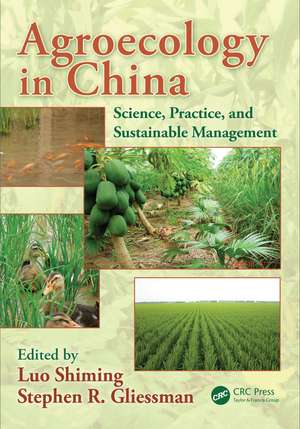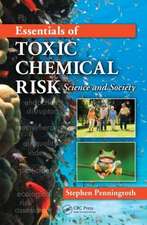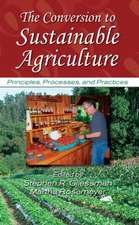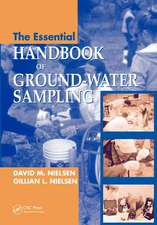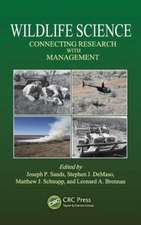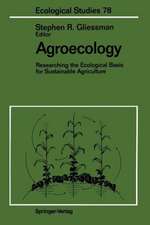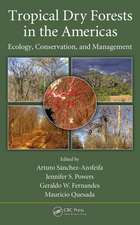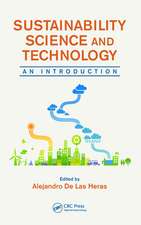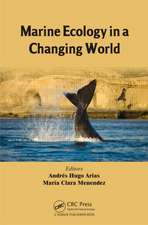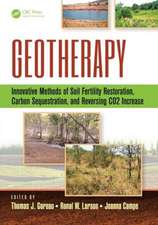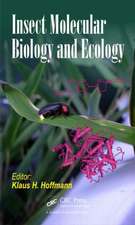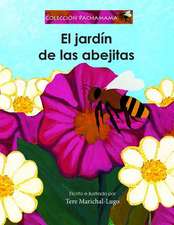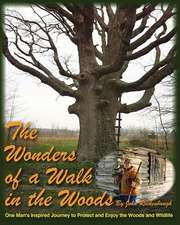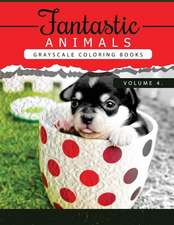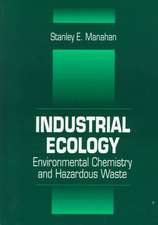Agroecology in China: Science, Practice, and Sustainable Management: Advances in Agroecology
Editat de Luo Shiming, Stephen R. Gliessmanen Limba Engleză Hardback – 28 mar 2016
During the past 30 years, industrialization has fundamentally changed traditional rural life and agricultural practices in China. While the incomes of farmers have increased, serious issues have been raised concerning the environment, resource depletion, and food safety. In response, the Chinese government and Chinese scientists encouraged eco-agriculture, the practice of agroecology principles and philosophy, as a way to reduce the negative consequences of large-scale industrialized systems of farming.
Agroecology in China: Science, Practice, and Sustainable Management represents the work of experts and leaders who have taught, researched, and expanded Chinese agroecology and eco-agriculture for more than 30 years. It reviews decades of agricultural change to provide an integrated analysis of the progress of research and development in agroecological farming practices.
The book contains research on traditional and newly developed agricultural systems in China, including intercropping systems, rainfall harvest systems, and rice–duck, rice–fish, and rice–frog co-culture systems. It covers current eco-agriculture practices in the major regions of China according to climate conditions. The book closes with a discussion of the major technical approaches, necessary policy support, and possible major development stages that must occur to allow broader agroecological implementations toward the sustainability of future food systems in China.
Presenting eco-agriculture systems that are somewhat unique in comparison to those of the United States, Latin America, and Europe, Agroecology in China gives insight on how Chinese agroecologists, under the political and cultural systems specific to China, have created a strong foundation for ecologically sound agroecosystem design and management that can be applied and adapted to food systems elsewhere in the world. By using selected regional examinations of agroecological efforts in China as examples, this book provides models of how to conduct research on a broad range of agroecosystems found worldwide.
| Toate formatele și edițiile | Preț | Express |
|---|---|---|
| Paperback (1) | 331.03 lei 43-57 zile | |
| CRC Press – 25 oct 2018 | 331.03 lei 43-57 zile | |
| Hardback (1) | 824.92 lei 43-57 zile | |
| CRC Press – 28 mar 2016 | 824.92 lei 43-57 zile |
Din seria Advances in Agroecology
- 13%
 Preț: 336.40 lei
Preț: 336.40 lei - 12%
 Preț: 331.03 lei
Preț: 331.03 lei - 13%
 Preț: 336.40 lei
Preț: 336.40 lei - 23%
 Preț: 396.77 lei
Preț: 396.77 lei - 13%
 Preț: 307.71 lei
Preț: 307.71 lei - 13%
 Preț: 307.81 lei
Preț: 307.81 lei - 13%
 Preț: 339.59 lei
Preț: 339.59 lei - 26%
 Preț: 991.71 lei
Preț: 991.71 lei - 26%
 Preț: 483.01 lei
Preț: 483.01 lei - 23%
 Preț: 326.27 lei
Preț: 326.27 lei - 24%
 Preț: 501.71 lei
Preț: 501.71 lei - 26%
 Preț: 1044.00 lei
Preț: 1044.00 lei - 25%
 Preț: 601.04 lei
Preț: 601.04 lei - 26%
 Preț: 767.79 lei
Preț: 767.79 lei - 26%
 Preț: 598.23 lei
Preț: 598.23 lei - 26%
 Preț: 759.80 lei
Preț: 759.80 lei - 26%
 Preț: 734.57 lei
Preț: 734.57 lei - 25%
 Preț: 661.55 lei
Preț: 661.55 lei
Preț: 824.92 lei
Preț vechi: 1108.50 lei
-26% Nou
Puncte Express: 1237
Preț estimativ în valută:
157.89€ • 164.56$ • 131.43£
157.89€ • 164.56$ • 131.43£
Carte tipărită la comandă
Livrare economică 06-20 ianuarie 25
Preluare comenzi: 021 569.72.76
Specificații
ISBN-13: 9781482249347
ISBN-10: 1482249340
Pagini: 472
Ilustrații: 157 black & white illustrations, 111 black & white tables
Dimensiuni: 178 x 254 x 31 mm
Greutate: 1 kg
Ediția:1
Editura: CRC Press
Colecția CRC Press
Seria Advances in Agroecology
ISBN-10: 1482249340
Pagini: 472
Ilustrații: 157 black & white illustrations, 111 black & white tables
Dimensiuni: 178 x 254 x 31 mm
Greutate: 1 kg
Ediția:1
Editura: CRC Press
Colecția CRC Press
Seria Advances in Agroecology
Cuprins
AN OVERVIEW. Agroecology Development in China. AGROECOLOGY RESEARCH AND PRACTICE ON A CROP–FIELD SCALE. How Above- and Below-Ground Interspecific Interactions between Intercropped Species Contribute to Overyielding and Efficient Resource Utilization: A Review of Research in China. Effects of Reduced Nitrogen Application Rates and Soybean Intercropping on Sugarcane Fields in Southern China. Integrated Rice–Fish Agroecosystems in China. Rice–Duck Co-Culture in China and Its Ecological Relationships and Functions. Study of Non-Point-Source Pollution Control in Integrated Rice–Frog Agroecosystems. Research on and Application of Rice Allelopathy and Crop Allelopathic Autotoxicity in China. Structure and Function of Grass-Covered Orchards in Fujian Province, China. Ecological Effects of No-Tillage Rice in Middle and Lower Reaches of the Yangtze River. Framework for Conversion: Ecological Mechanisms and Regulation of Greenhouse Organic Vegetable Production in North China. REGIONAL ECO-AGRICULTURAL PRACTICE AND MANAGEMENT. Status quo and Development Policies of Organic Agriculture in China. Highly Efficient Utilization of Rainfall Promotes Dryland Agroecosystem Sustainable Development on the Loess Plateau. Agroecology Research and Practice in the Oasis Region, Northwest China. Ecological Agriculture on Arid, Sloped Land in Dry–Hot Yunnan Valley. Eco-Agricultural Practices of State Farms in Heilongjiang Province. Developing Agroecology Practice in Baiquan County. PERSPECTIVE. Development and Prospect of China’s Eco-Agriculture—Agroecology Practice.
Notă biografică
Luo Shiming completed his undergraduate and graduate study at the South China Agricultural University in Guangzhou, where he later served as president for 11 years. He also studied agroecology at the Institute of Ecology, University of Georgia, United States. His textbook Agroecology has had great influence in agricultural universities in China since its first publication in 1987, and it is now approaching its fourth edition. His research has included the use of biodiversity in agriculture, energy flow and material circulation in agroecosystems, allelopathy, practical eco-agriculture systems in South China, and computer simulation of rice field systems and artificial wetland systems for wastewater treatment in agriculture. His work has earned several national and provincial awards in China, including China National Outstanding Professor, and an honorary doctoral degree from Pennsylvania State University. He has also been the executive vice president of the World Allelopathy Society, the first president of the Asian Allelopathy Society, president of the Agroecology Committee under the China Ecological Society, vice president of the China Ecology Society, and vice president of the China Agricultural Society.
Stephen R. Gliessman holds graduate degrees in botany, biology, and plant ecology from the University of California, Santa Barbara. He has more than 40 years of teaching, research, and production experience in the field of agroecology. He was the founding director of the agroecology program at the University of California, Santa Cruz, one of the first formal agroecology programs in the world. He is also the cofounder of the nonprofit Community Agroecology Network, Santa Cruz, California, and currently serves as president of its board of directors. His textbook Agroecology: The Ecology of Sustainable Food Systems is in its third edition and has been translated into many languages, and he is the editor of the international journal Agroecology and Sustainable Food Systems.
Stephen R. Gliessman holds graduate degrees in botany, biology, and plant ecology from the University of California, Santa Barbara. He has more than 40 years of teaching, research, and production experience in the field of agroecology. He was the founding director of the agroecology program at the University of California, Santa Cruz, one of the first formal agroecology programs in the world. He is also the cofounder of the nonprofit Community Agroecology Network, Santa Cruz, California, and currently serves as president of its board of directors. His textbook Agroecology: The Ecology of Sustainable Food Systems is in its third edition and has been translated into many languages, and he is the editor of the international journal Agroecology and Sustainable Food Systems.
Descriere
This book represents the work of experts and leaders who have taught, researched, and expanded Chinese agroecology and eco-agriculture for more than 30 years. It reviews several decades of agricultural change to provide an integrated analysis of the progress of research and development in agroecological farming practices.
